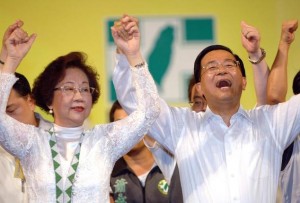Special to WorldTribune.com
Former vice president Annette Lu began a hunger strike on Dec. 28 in support of former president Chen Shui-bian, who has been in prison since 2008 and suffers from multiple mental and physical disorders.
Speaking at a news conference before the hunger strike began, Lu accused the government of political interference in Chen’s trial and conviction, and violation of judicial due process.

The current Taiwan government is headed by the Kuomintang (KMT) party’s President Ma Ying-jeou who has favored warmer ties with the Chinese Communist Party’s regime on the mainland.
Lu served under former President Chen Shui-bian who has been in jail since late 2008 with deteriorating health conditions. He and Lu led the opposition Democratic Progressive Party (DPP) which champions Taiwan independence.
[Related: Beijing’s strategy to ‘buy’ Taiwan: Coerced unification without firing a shot, Feb. 19.]
Chen’s imprisonment has further politically polarized Taiwan and releasing him could be a first step toward reconciliation. As Annette Lu is close to 70 , her hunger strike in support of former President Chen has been a major new story in all of Taiwan’s papers and TV outlets.
The medical team appointed by the government suggested that he be released for home care, but Ministry of Justice (MOJ) denied the suggestion and postponed appropriate treatment for Chen.
[Related: New movement in Taiwan advocates the Swiss option: Armed neutrality, Oct. 28]
According to Article 58 of Taiwan’s Prison Act, “If an inmate suffering from diseases could not receive appropriate treatment in prison, it may be taken into account to release him on bail for medical treatment, to transfer him to specific prisons or hospitals with permission of supervisory authority.”
Lu believes that the MOJ neglected its duty and there might be more prisoners who need appropriate medical treatment.
According to medical examinations, Chen has suffered from serious sleep apnea, major depressive disorder, prostatitis, delusional disorder, and stammer.
Taiwan’s strong economy and political system which places high value on democracy, rule of law, and respect for human rights has offered a strong counterpoint to the People’s Republic of China which has long focused its strategy on isolating Taiwan diplomatically. But growing economic ties have bring the two countries closer together politically.
However, the growing perception that the Ma government has become too close to Beijing has seen a precipitous drop in his popularity. Public sympathy for the pro-democracy demonstrations in Hong Kong has increased political pressure on Ma as has criticism of the harsh treatment of former President Chen which is said to violate provisions of the International Covenant on Civil and Political rights and the UN Convention against Torture and other Cruel, Inhuman or Degrading Punishment.
Lu was accompanied by Chen’s son, Chih-chung, his sisters, Chen Hsiu-ching and Chen Hsiu-chin, as well as Democratic Progressive Party (DPP) Secretary-General Joseph Wu, former minister of national defense Tsai Ming-shian, members of legislative yuan (parliament), city councilors of Taipei and New Taipei City, newly elected mayor of Chiayi, and many leaders of NGOs. She declared in front of the National Taiwan Museum that she would remain on a hunger strike until the government decides to release Chen Shui-bian.

You must be logged in to post a comment Login